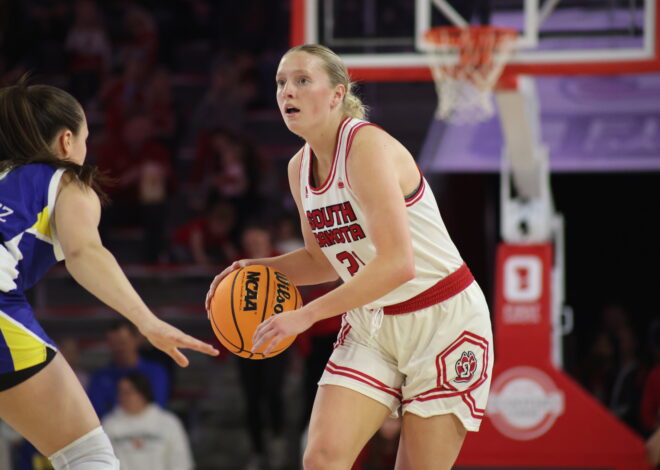Intramural basketball competes at higher level
Intramural basketball is an entertaining event, enjoyed by many students at the University of South Dakota throughout the year, especially those involved in Greek Life.
Although plenty of students are involved in intramurals, many do not know the work that goes into making it run, especially for the Greek League.
“Every week we send email updates through iamleagues,” Wellness Center Assistant Director Samantha Lowry said. “We are also going to start a table this week in the Muenster University Center to sign people up with a computer to get more interested students involved.”
While the league couldn’t run without the players, one group that is often not talked about is the intramural referees. However with changes in training the last few years, Lowry believes the referees are steadily improving.
“We have increased numbers of teams from last year. While the year before last the numbers were the same, a lot of people say that the officiating has gotten better,” she said.
Some players however feel differently including freshman Delt 2 player Kyle Brunick who said, “The officials do their best, but I’m a big guy, and I swat a lot of people and should be fouled out of the game a lot quicker than I usually am. I don’t know if they are bad, I think they just want us to decide the outcome.”
Officiating is always a touchy subject between league staff and the players Lowry said.
“The officials go through a six-hour training process before they can referee games, but I believe even if there were NBA officials there would be some discrepancy in the calls,” she said.
Other than officiating, the game has changed drastically through a rules change regarding fouls. The league has now switched over to high school rules with a bonus and double bonus rather than the old rules of free-throws only in the last minute of the game. This means a more realistic atmosphere, but also more pressure on the referees to do their job.
With the new rules and advancement of officiating, the Greek League finished up its season last Thursday and advance to the playoffs starting Feb. 20.
The teams play six regular season games with a single-elimination tournament to wrap up the season, where only teams above .500 make the playoffs.
“I think six games is ok, because there are not a lot of teams in the Greek League, but we played the same team three times, so half of our games came against one opponent,” Brunick said. “I think it would be better if there was a round-robin structure then a break into the playoffs.”
Competitiveness is especially evident in the Greek League as compared to the Men’s League and Rec League because of rivalries between fraternities.
“You want to beat the other fraternities, it makes it a little more competitive because of this,” Brunick said. “I played non-Greek last semester and there was much less strategy and it felt like it was just for fun.”
Regardless, of the intensity, all three leagues push through the regular season and finish with a champion.
“I think there is a lot of competition in all leagues, but the Greek’s definitely draw the most supporters,” Lowry said. “Every champion receives a reward for being winning their respective league, and I think that makes competitiveness go up”
After spring break, the intramurals don’t stop as volleyball and softball start right away, and events go all the way until the end of the year.

